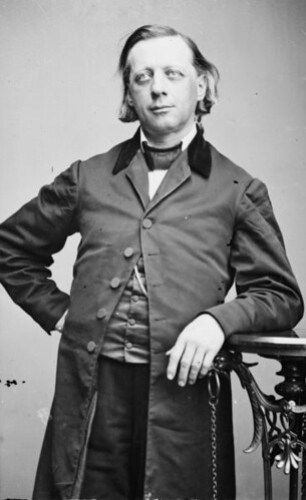Posts Tagged ‘Henry Ward Beecher’
Tricks of (Historical) Perspective, Part 72…

These days, the name Henry Ward Beecher conjures, if at all, only in that it evokes his better-remembered sister, Harriet Beecher Stowe. But in his time Beecher (pictured above, in a Matthew Brady portrait) was a much more prominent presence.
The first pastor of the Plymouth Church in Brooklyn, New York, Beecher shared his sister’s commitment to social causes; in particular, to abolition. But at the same time he turned a gift for tempering self-improvement advice with dialect and humor into a fabulously-successful career on the lecture circuit. (Click here to read a wonderful example of Beecher’s helpful homilies, as reported in the Falkirk Herald in 1871.)
Such was Beecher’s standing that, the following year, when Beecher was outed (then subsequently tried) for adultery (with Theodore Tilton’s wife Elizabeth), it “drove Reconstruction off the front pages for two and a half years” and became “the most sensational ‘he said, she said’ in American history” (quoth Walter McDougall). Indeed, French author George Sand planned a novel about the affair, but died before it could be written.
In his time, Beecher was arguably The Most Famous Man in America.
###
As we look to our Ps and Qs, we might send a birthday verse to Henry Charles Bukowski; he was born on this date in 1920. The “laureate of American lowlife,” Bukowski discovered his muse as a young teen, when a friend introduced him to drinking (as recounted in Ham on Rye). “This [alcohol] is going to help me for a very long time”, he later wrote, describing the genesis of what was chronic alcoholism– or, as he saw it, the genesis of a method for making his way through life as a writer.
Van Gogh writing his brother for paints
Hemingway testing his shotgun
Celine going broke as a doctor of medicine
the impossibility of being human– “Beasts Bounding Through Time”
In the end, Bukowski wrote thousands of poems, hundreds of short stories, and six novels, eventually publishing over sixty books. As Adam Kirsch of The New Yorker observed, “the secret of Bukowski’s appeal. . . [is that] he combines the confessional poet’s promise of intimacy with the larger-than-life aplomb of a pulp-fiction hero.”

You must be logged in to post a comment.